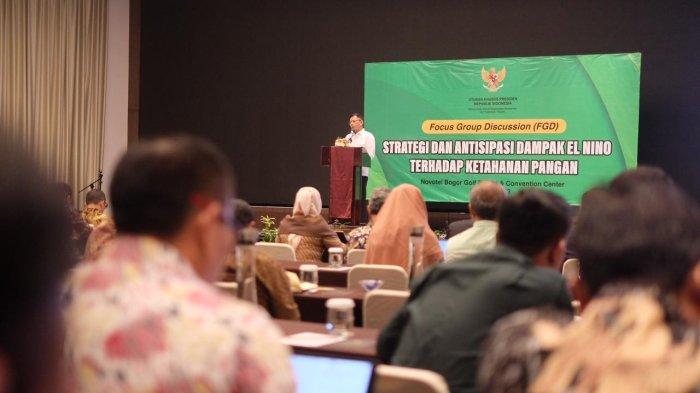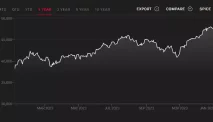Diksia.com - JAKARTA, Indonesia’s Special Presidential Representative (UKP) for Poverty Reduction and Food Security Cooperation Muhamad Mardiono stressed the importance of strategy and anticipation of all elements of society in the country in dealing with the impact of El Niño.
El Nino is expected to peak in August-September 2023 and threaten food security in Indonesia.
UKP Muhamad Mardiono recently said in a keynote speech at the Strategy Focus Group Discussion (FGD) and Anticipating the Impact of El Nino on Food Security at the Novotel Bogor Golf Resort and Convention Center in Bogor that the El Nino phenomenon poses a serious threat to food security in Indonesia.
“Due to the El Niño phenomenon, we are facing a drought that could impact national food production. “We really need to face this long and extreme drought with a good strategy,” said Mardiono.
If not anticipated and mitigated with a good strategy, the drought will turn into a disaster and even have other side effects such as crop failures, drinking water crises and land fires that directly impact the sustainability of food security.
It was reported that El Niño reduced rice production in Indonesia by 1 to 5 million tons between 1990 and 2020.
A number of studies conducted have also shown similar results, including the decline in rice production in Banten from 2002 to 2015 due to the El Niño phenomenon. This year, the Central Statistics Agency (BPS) recorded a realized rice production of 2.8 million tons and 5 million tons for February and March 2023, respectively, which is lower than the previous forecast which put it at 3.6 million tons and 5 million tons, respectively tons has been set.
“El Nino and La Nina are indeed phenomena that are already common, and the BMKG has also predicted that Indonesia will experience its most extreme peak in August 2023. Become a locomotive in dealing with this natural phenomenon, while considering the impact of El Nino on the agricultural sector is direct and real,” he said.
In addition, Mardiono stressed the need for special attention on the part of the competent authorities by issuing guidelines in the form of protective measures for farmers suffering crop failures due to the effects of extreme climatic conditions, since forest and land fires, in addition to huge economic losses, also have serious consequences on the impact on the Health. frightening.
Looking back on past experiences, the smog that blanketed cities and even reached neighboring countries has led to many evictions into homes that provide healthier air.
Stop wasting food
In the context of efforts to realize food security, UKP Mardiono also focuses on consumer culture patterns in society that are beginning to show symptoms of food waste, particularly the food waste and food loss phenomenon in Indonesia.
“I would like to share that 2021 data from UNEP shows that Indonesia is the fourth largest producer of food waste in the world after China, India and Nigeria, with the total amount of food waste reaching 21 million tons annually,” he said.
In fact, food waste in Indonesia ranges from 23 to 48 million tons per year, according to Bappenas, which translates to 115 to 184 kilograms per person per year. The amount of food waste has economic, social and environmental implications.
Because of this food waste, Bappenas estimates that the country will suffer at least IDR 213-551 trillion in economic losses per year, equivalent to 4-5 percent of Indonesia’s GDP.
“Food waste also contributes about 8 to 10 percent of greenhouse gas emissions. Therefore, I think that in the future there is an urgent need to change people’s culture through the program campaign “Eat in moderation” or “One serving is enough” “You can adjust people’s behavior by eating less food and at Add as needed according to the portion of food,” he said.
This is solely to prevent the creation of food waste, which then becomes food waste. The program’s “Spend Wisely” campaign to reduce moldy and expired food supplies must also continue.
In addition, a good food storage area is required to prevent food from becoming stale. For example, in addition to the need for a “food-sharing” program to prevent food from being expired, there is a need to work with modern markets or supermarkets to distribute food that is close to its sell-by date. This is done no differently than food waste can be suppressed to ensure quality food security in Indonesia.
On the same occasion, the head of the National Food Administration (Bapanas), Arief Prasetyo Adi, said that research by the World Food Program (WFP) had shown that countries with higher climate vulnerabilities tended to lead to food insecurity, affecting malnourished populations.
“Indonesia is a region with moderate climate vulnerability, so awareness and anticipation are needed to reduce the potential for a food crisis. “It will take political will and collective action steps to increase production of rice, soybeans, beef and sugar consumption to meet national needs,” Arief said.
Source: Tribunnews.com, Hendra Gunawan






